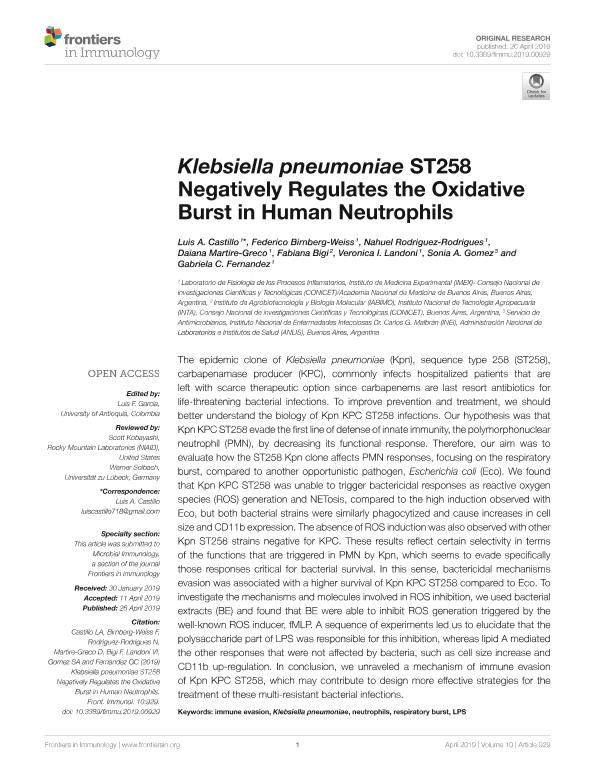Mostrar el registro sencillo del ítem
dc.contributor.author
Castillo Montañez, Luis Alejandro

dc.contributor.author
Birnberg Weiss, Federico

dc.contributor.author
Rodriguez Rodrigues, Nahuel Emiliano

dc.contributor.author
Martire Greco, Daiana

dc.contributor.author
Bigi, Fabiana

dc.contributor.author
Landoni, Verónica Inés

dc.contributor.author
Gómez, Sonia Alejandra

dc.contributor.author
Fernández, Gabriela Cristina

dc.date.available
2020-05-22T18:34:43Z
dc.date.issued
2019-04
dc.identifier.citation
Castillo Montañez, Luis Alejandro; Birnberg Weiss, Federico; Rodriguez Rodrigues, Nahuel Emiliano; Martire Greco, Daiana; Bigi, Fabiana; et al.; Klebsiella pneumoniae ST258 Negatively Regulates the Oxidative Burst in Human Neutrophils; Frontiers Media S.A.; Frontiers in Immunology; 10; APR; 4-2019; 1-16
dc.identifier.issn
1664-3224
dc.identifier.uri
http://hdl.handle.net/11336/105780
dc.description.abstract
The epidemic clone of Klebsiella pneumoniae (Kpn), sequence type 258 (ST258), carbapenamase producer (KPC), commonly infects hospitalized patients that are left with scarce therapeutic option since carbapenems are last resort antibiotics for life-threatening bacterial infections. To improve prevention and treatment, we should better understand the biology of Kpn KPC ST258 infections. Our hypothesis was that Kpn KPC ST258 evade the first line of defense of innate immunity, the polymorphonuclearneutrophil (PMN), by decreasing its functional response. Therefore, our aim was to evaluate how the ST258 Kpn clone affects PMN responses, focusing on the respiratory burst, compared to another opportunistic pathogen, Escherichia coli (Eco). We found that Kpn KPC ST258 was unable to trigger bactericidal responses as reactive oxygen species (ROS) generation and NETosis, compared to the high induction observed withEco, but both bacterial strains were similarly phagocytized and cause increases in cell size and CD11b expression. The absence of ROS induction was also observed with other Kpn ST258 strains negative for KPC. These results reflect certain selectivity in terms of the functions that are triggered in PMN by Kpn, which seems to evade specifically those responses critical for bacterial survival. In this sense, bactericidal mechanisms evasion was associated with a higher survival of Kpn KPC ST258 compared to Eco. To investigate the mechanisms and molecules involved in ROS inhibition, we used bacterial extracts (BE) and found that BE were able to inhibit ROS generation triggered by the well-known ROS inducer, fMLP. A sequence of experiments led us to elucidate that the polysaccharide part of LPS was responsible for this inhibition, whereas lipid A mediated the other responses that were not affected by bacteria, such as cell size increase and CD11b up-regulation. In conclusion, we unraveled a mechanism of immune evasion of Kpn KPC ST258, which may contribute to design more effective strategies for the treatment of these multi-resistant bacterial infections.
dc.format
application/pdf
dc.language.iso
eng
dc.publisher
Frontiers Media S.A.

dc.rights
info:eu-repo/semantics/openAccess
dc.rights.uri
https://creativecommons.org/licenses/by-nc-sa/2.5/ar/
dc.subject
IMMUNE EVASION
dc.subject
KLEBSIELLA PNEUMONIAE
dc.subject
NEUTROPHILS
dc.subject
RESPIRATORY BURST
dc.subject
LPS
dc.subject.classification
Inmunología

dc.subject.classification
Medicina Básica

dc.subject.classification
CIENCIAS MÉDICAS Y DE LA SALUD

dc.title
Klebsiella pneumoniae ST258 Negatively Regulates the Oxidative Burst in Human Neutrophils
dc.type
info:eu-repo/semantics/article
dc.type
info:ar-repo/semantics/artículo
dc.type
info:eu-repo/semantics/publishedVersion
dc.date.updated
2020-04-23T19:25:02Z
dc.journal.volume
10
dc.journal.number
APR
dc.journal.pagination
1-16
dc.journal.pais
Estados Unidos

dc.description.fil
Fil: Castillo Montañez, Luis Alejandro. Consejo Nacional de Investigaciones Científicas y Técnicas. Instituto de Medicina Experimental. Academia Nacional de Medicina de Buenos Aires. Instituto de Medicina Experimental; Argentina
dc.description.fil
Fil: Birnberg Weiss, Federico. Consejo Nacional de Investigaciones Científicas y Técnicas. Instituto de Medicina Experimental. Academia Nacional de Medicina de Buenos Aires. Instituto de Medicina Experimental; Argentina
dc.description.fil
Fil: Rodriguez Rodrigues, Nahuel Emiliano. Consejo Nacional de Investigaciones Científicas y Técnicas. Instituto de Medicina Experimental. Academia Nacional de Medicina de Buenos Aires. Instituto de Medicina Experimental; Argentina
dc.description.fil
Fil: Martire Greco, Daiana. Consejo Nacional de Investigaciones Científicas y Técnicas. Instituto de Medicina Experimental. Academia Nacional de Medicina de Buenos Aires. Instituto de Medicina Experimental; Argentina
dc.description.fil
Fil: Bigi, Fabiana. Instituto Nacional de Tecnologia Agropecuaria. Centro de Investigacion En Ciencias Veterinarias y Agronomicas. Instituto de Agrobiotecnologia y Biologia Molecular. - Consejo Nacional de Investigaciones Cientificas y Tecnicas. Oficina de Coordinacion Administrativa Pque. Centenario. Instituto de Agrobiotecnologia y Biologia Molecular; Argentina
dc.description.fil
Fil: Landoni, Verónica Inés. Consejo Nacional de Investigaciones Científicas y Técnicas. Instituto de Medicina Experimental. Academia Nacional de Medicina de Buenos Aires. Instituto de Medicina Experimental; Argentina
dc.description.fil
Fil: Gómez, Sonia Alejandra. Dirección Nacional de Instituto de Investigación. Administración Nacional de Laboratorio e Instituto de Salud "Dr. C. G. Malbrán"; Argentina. Consejo Nacional de Investigaciones Científicas y Técnicas; Argentina
dc.description.fil
Fil: Fernández, Gabriela Cristina. Consejo Nacional de Investigaciones Científicas y Técnicas. Instituto de Medicina Experimental. Academia Nacional de Medicina de Buenos Aires. Instituto de Medicina Experimental; Argentina
dc.journal.title
Frontiers in Immunology
dc.relation.alternativeid
info:eu-repo/semantics/altIdentifier/url/https://www.frontiersin.org/article/10.3389/fimmu.2019.00929/full
dc.relation.alternativeid
info:eu-repo/semantics/altIdentifier/doi/http://dx.doi.org/10.3389/fimmu.2019.00929
Archivos asociados
